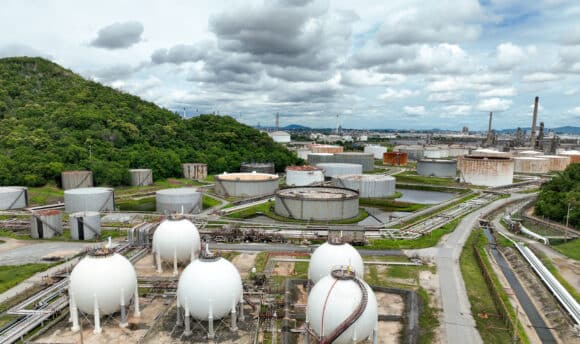Global, 9 November 2023 – Fifty years after the insurance industry first warned about the impact of climate change it is continuing to fuel the climate emergency, the Insure Our Future campaign warns today in its seventh annual scorecard on insurers’ climate policies.
The growing frequency and severity of floods, hurricanes, wildfires, droughts and other climate-related disasters has seen insurance payouts for natural catastrophes soar to an average $110 billion a year since 2017, more than twice the average over the previous five years. Insurers are now declining to insure home owners in markets at greatest risk.
Yet the report reveals that most insurers continue to support projects to increase oil and gas production, even though the world’s leading climate scientists at the Intergovernmental Panel on Climate Change and experts at the International Energy Agency agree that this is incompatible with the 1.5°C Paris climate target.
Fossil fuel insurance earned the industry around $21.25 billion in 2022, according to research commissioned for the report from Insuramore, a respected market intelligence firm in the insurance sector. Insurers on the Lloyd’s of London market collectively are the world’s biggest fossil fuel underwriters with an estimated $1.6-$2.2 billion in annual premiums. The top ten individual insurers include AEGIS, Chubb, Allianz, AXA, Fairfax Financial, Zurich, W. R. Berkley and AIG.
“The insurance industry first warned about climate risks in 1973, and these have now become a grim reality, particularly for low-income countries and communities which have contributed least to the climate emergency. Insurance companies are now abandoning customers affected by climate risks, yet they continue to fuel the climate crisis by underwriting and investing in the expansion of fossil fuels."
“If insurance companies took climate science seriously, they would fully align their underwriting and investment strategies with a credible 1.5°C pathway and end all support for increased fossil fuel production. They would be suing fossil fuel companies, to make polluters pay for the growing costs of climate disasters and keep insurance affordable for climate-affected communities.”
Top 10 fossil fuel insurers in 2022 (in million $) – Insuramore estimates
| Rank | Name | Country of HQ | Premium range | Midpoint |
| 1. | AEGIS | Bermuda | 1,550-1,850 | 1,700 |
| 2. | PICC | China | 1,250-1,650 | 1,450 |
| 3. | Sogaz | Russia | 800-1,100 | 950 |
| 4. | Chubb | USA | 550-850 | 700 |
| 5. | Allianz | Germany | 475-775 | 625 |
| 6. | AXA | France | 450-750 | 600 |
| 6. | Fairfax Financial | Canada | 450-750 | 600 |
| 6. | Zurich | Switzerland | 450-750 | 600 |
| 9. | W.R. Berkley | USA | 525-625 | 575 |
| 10. | AIG | USA | 425-675 | 550 |
“Insurance companies are in a powerful position to protect people and the planet. They need to truly protect communities impacted by the climate crisis, rather than supporting the fossil fuel industry and prioritising profit."
Fifty years of failure
Munich Re published the insurance industry’s first warning about the growing risks of climate change in August 1973, stating that rising temperatures would lead to “retreat of glaciers and polar caps, shrinking of lake surfaces and an increase in marine temperatures.”
Fifty years on, fossil fuel consumption and CO2 emissions continue to increase. Thousands of new fossil fuel projects are in the pipeline, and the scorecard warns that if they are insured and built, they “will lock in increased consumption for decades to come and will completely destroy our chances of limiting global warming to 1.5°C”.
According to Global Energy Monitor, in addition to hundreds of coal, oil and gas extraction projects, 655 coal power plants, 238 LNG import terminals, 980 gas power plants, 210,000km of gas pipelines and 31,000km of oil pipelines are currently proposed or under construction.
Insurers are now seeking to limit their future losses from climate risks. Capital for reinsurance fell by 20-25% in 2022 and this, together with growing financial risk, caused a spike in premiums, according to a briefing on natural catastrophes by the Swiss Re Institute. Major companies have reduced cover or left the property market altogether, including AIG Re, AXIS Capital, AXA XL, Everest Re and SCOR.
In the past year, primary insurers that accounted for more than two fifths of California’s home insurance market have pulled out following years of escalating climate disasters. They include State Farm, Allstate, Chubb, Tokio Marine, AIG and Berkshire Hathaway’s AmGUARD. Companies have also stopped insuring homes in Florida and Louisiana and in parts of Australia, leaving homeowners highly vulnerable and with significantly reduced property values.
Leading insurers have also dropped climate change commitments they made as members of the Net Zero Insurance Alliance, launched in the run-up to COP26 in Glasgow. Members committed to reduce emissions from the companies they insure by 34% from 2019-2030 and pledged to publish a transition plan by June 2023 and net zero targets by the end of July.
By the end of September 2023, 20 of the 31 members had left the alliance under threat of anti-trust action in the US. Only a handful have published transition plans and net zero targets and none have adopted targets to reduce their absolute insured emissions by 34%. The scorecard says companies have “greenwashed their ongoing fossil fuel profits but have not produced any tangible results.”
”Insurers talk a lot about their climate commitments and supporting their clients through the energy transition, but this is plain greenwashing. They are still profiting from providing cover that allows companies to develop new fossil fuel projects. Insurers could be a force for change, but instead they are undermining climate action.”
Restrictions on oil and gas far weaker than on coal
The 2023 Scorecard on Insurance, Fossil Fuels and the Climate Emergency, scores and ranks the climate policies of 30 major insurers and is published by 22 organisations from 12 countries. This year, as a symbol of insurers’ failure to adequately respond to the climate emergency, it leaves the first three places in its ranking table empty.
- Fossil Fuel Insurance: Allianz ranks highest for its overall policies followed by Generali, Aviva and Swiss Re.
- Coal Insurance: Allianz is the only company to score 10/10. It is followed by AXA, Swiss Re and Generali.
- Oil & Gas Insurance: Aviva and Generali have the strongest restrictions, but score just 4.0/10. Only they and German insurers Allianz, Hanover Re, Talanx and Munich Re, ranked 3rd, 4th, 6th and 7th, have ceased insuring new oil and gas production without major exceptions. None of the 30 insurers have ended cover for new gas power plants, and almost none have ended support for a wave of new liquefied fossil gas (LNG) terminals.
Insurers have continued to introduce restrictions on coal, and although progress has slowed, coal companies are finding it ever harder to get insurance for new projects and, increasingly, for existing operations. Insuramore calculates that insurance companies with a 41.2% share of the commercial property and casualty market and a 62.7% share of the reinsurance market have now taken action, up from 39.8% and 58.2% respectively in 2022.
Far fewer insurers have introduced policies on oil and gas, and restrictions are much more limited than on coal. Companies with a 19.6% share of the commercial property and casualty market and 46.7% share of the reinsurance market have taken action, up from 15.4% and 43.4%, according to Insuramore.
The scorecard says: “Insurers talk a lot about the need for oil and gas companies to transition away from fossil fuels. In reality, they are not advocating for a transition away from fossil fuel extraction but are satisfied if fossil fuel companies adopt shallow net zero commitments, shift from coal to gas extraction, invest in renewable energy projects and reduce their operational emissions. This does nothing to reduce the climate impact of burning the oil and gas these companies sell, which is by far the biggest part of their life-cycle emissions.”
Growing pressure to align with 1.5°C
The insurance industry faces growing pressure to align with credible 1.5°C pathways. Under the EU’s draft Solvency II rules, insurers will need to publish transition plans with quantifiable targets and processes for reaching net zero by 2050. In the US, the Senate Budget committee has launched an investigation into how the industry evaluates climate risks and pressed insurers to disclose their cover for and investments in fossil fuels.
In the scorecard, Insure Our Future calls on the International Association of Insurance Supervisors, currently holding its annual meeting in Tokyo (November 9-10) to create a process for regulating the alignment of insurance underwriting with climate science, including a mandatory requirement for science-based transition plans.
It also notes that on November 28-29, on the eve of the COP28 climate summit, insurance company CEOs will gather in Zurich to celebrate the 50th anniversary of the Geneva Association, the industry’s think tank, and to discuss the role of insurers in accelerating the world’s decarbonisation.
“These CEOs have been aware of the risks which climate change poses to global society throughout their professional careers. They are in a powerful position to support and accelerate the global transition from fossil fuels to clean technologies,” says the scorecard.
“A scorched, uninsurable world is a world without an insurance industry and so insurance companies have an eminent self-interest in scaling up their climate action. Insurers have demonstrated that they can accelerate the shift away from fossil fuels through their coal exit policies. They urgently need to adopt similar policies on oil and gas.”
“Everyone knows we have to act, but who goes first? Insurance goes first. That’s its business! It calculates risk and refuses to insure risks that are too dangerous to cover. That’s precisely the calculation it is designed to make. So now it needs to stop insuring the fossil fuel industry.”
Scoring Grid
| (Re)insurer | Category | Country | Coal Insurance | Oil and Gas Insurance | Total Ranking |
| * | 1 | ||||
| * | 2 | ||||
| * | 3 | ||||
| Allianz | Insurer | DE | 1 | 3 | 4 |
| Generali | Insurer | IT | 4 | 1 | 5 |
| Aviva | Insurer | UK | 6 | 1 | 6 |
| Swiss Re | Reinsurer | CH | 3 | 5 | 7 |
| AXA | Insurer | FR | 2 | 9 | 8 |
| Hannover Re | Reinsurer | DE | 9 | 4 | 9 |
| Axis Capital | Reinsurer | BE | 5 | 13 | 10 |
| Zurich | Insurer | CH | 7 | 11 | 11 |
| Munich Re | Reinsurer | DE | 10 | 7 | 12 |
| SCOR | Reinsurer | FR | 8 | 10 | 13 |
| HDI Global – Talanx | Insurer | DE | 12 | 6 | 14 |
| Mapfre | Insurer | ES | 11 | 8 | 15 |
| QBE | Insurer | AU | 13 | 15 | 16 |
| AIG | Insurer | US | 14 | 14 | 17 |
| Chubb | Insurer | US | 16 | 12 | 18 |
| Sompo | Insurer | JP | 16 | 16 | 19 |
| Tokio Marine | Insurer | JP | 16 | 17 | 20 |
| MS&AD | Insurer | JP | 16 | 17 | 20 |
| Samsung FM | Insurer | KR | 15 | 17 | 22 |
| The Hartford | Insurer | US | 16 | 20 | 23 |
| Travelers | Insurer | US | 16 | 20 | 24 |
| Ping An | Insurer | CN | 22 | 23 | 25 |
| Liberty Mutual | Insurer | US | 22 | 23 | 26 |
| Lloyd’s | Reinsurer | UK | 24 | 22 | 27 |
| Berkshire Hathaway | Reinsurer | US | 25 | 23 | 28 |
| Everest Re | Reinsurer | BE | 25 | 23 | 28 |
| PICC | Insurer | CN | 25 | 23 | 28 |
| Sinosure | Insurer | CN | 25 | 23 | 28 |
| Starr | Insurer | US | 25 | 23 | 28 |
| WR Berkley | Insurer | US | 25 | 23 | 28 |
* The top three “podium” places are left empty as a symbol of insurers’ failure to adequately respond to the climate emergency.



